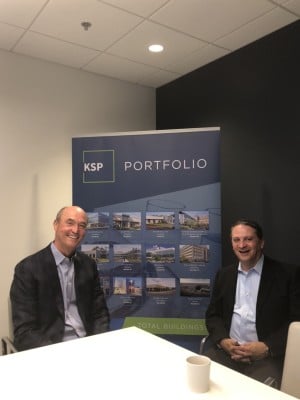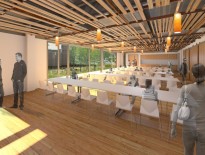Thomas Ragno and Stephen Lynch
Partners, King Street Properties
Ages: 62 and 57
Industry experience: 40 and 32 years
Veteran brokers Tom Ragno and Stephen Lynch met for breakfast at Denny’s in Lexington, trying to hash out a stalemate over an office lease negotiation in downtown Boston. No longer surrounded by their respective attorneys in a boardroom, the two ironed out their differences and forged a relationship that later culminated with an offer for Lynch to join Ragno’s King Street Properties in 2007. The Boston-based development firm has become the nation’s largest private owner of life science space, building and acquiring lab properties in and around the edges of Greater Boston’s life science cluster, and waiting for the industry’s expansion to fill up the spaces. In its latest venture, King Street is partnering with Boston-based Mugar Enterprises and the Stadium Auto Body owners on a proposed 560,000-square-foot office and lab complex at 250-280 and 305 Western Ave. in Allston.
Q: Has King Street always focused exclusively on life science properties?
Tom: We pivoted exclusively to that shortly after Stephen joined in 2007. In 2006, we bought a property on Bear Hill Road in Waltham and we had the idea that some of the one- and two-story buildings would work well for life science. We ended converting about 30 or 40 percent of that portfolio into life science. Because of our reputations and experience in that sector, that’s actually still a pretty small world in terms of the brokerage community, the architects, the contractors and the tenants. We knew it well and right away we were getting calls for bigger requirements which we couldn’t accommodate. So, we made a foray into Lexington at 101 Hartwell Ave. That was our first purchase in Lexington in 2010. We ended up buying 4 Hartwell, 113 Hartwell and 4 Hartwell Place and assembled 20 acres there and converted those buildings one by one. We were doing it personally, negotiating leases and working out construction contracts and getting permits.
Q: Why did you like the Hartwell Avenue corridor?
Stephen: Two reasons. We tend to establish ourselves in existing life science modes or just on the edges of them. We’re not the guys who try to go to some bold new place far away and try to make a market. Beginning in 1998, Hartwell Avenue had started seeing some conversions of low-rise industrial buildings to lab space. And that had been done by Alexandria Real Estate (Equities), but they stopped doing that because they had been so successful in Kendall Square. Reason two was the availability of structures that are readily convertible to lab. Lab space can’t go everywhere, and the buildings that had been built on Hartwell Avenue from the 1960s through the 1970s were designed to meet the needs of companies doing defense work associated with Hanscom Air Force Base and later mainframe computer companies like Wang and Digital Equipment. They’re buildings that have lasting reusability. Each of the first three buildings we purchased, we purchased in off-market transactions. They weren’t for sale. We knocked on the doors of the owner or their broker and said, ‘Hey, would you think about selling us that building?’ It wasn’t a secret assemblage; it was hiding in plain sight. Once we got the first building, we quickly moved to get the others because we were having really good leasing success. We’ve bought existing structures that had non-lab uses and converted to class A lab. Second, we’ve bought existing corporate-owned laboratory buildings that were single-tenant from companies like Pfizer and Merck, and done conversions to multi-tenant lab buildings. And we build out of the ground and quite often that involves extensive permitting.
Q: Do you anticipate accelerating demand for life science manufacturing space?
Tom: We’re seeing more and more requirements for that, and that’s what drove us to Framingham. Most of those uses will not be in Cambridge. They’ll have to seek other locations, but they’ll still going to want access to the biotech workforce because of the new technologies like gene therapies that require a very skilled labor force. So, we liked Framingham. Sanofi had been there for a long time, and there’s an employee base built around that location. We’re actively looking at other areas where we think biomanufacturing could work.
Q: What are your thoughts on the city of Cambridge’s study of future development in the Alewife Quad area, including light industrial and mixed uses?
Tom: The issue has always been traffic in the Alewife area. What Cambridge is trying to do, which I think is wise, is get a mix of uses that maybe will not be as dense as office or retail. You’ve got some housing there right now, so that hopefully will keep some portion of the people who work there, living there too. Life science will work with that. We have three assets in Alewife. We’re still invested, so we’re believers.
Q: How long had you been in discussions with Mugar Enterprises on the Allston project?
Tom: They were early believers in this sector, and now everybody’s piling on. We’ve done seven separate investments with them. We’ve probably been talking about it for about a year now. In that case, Mugar bought the land and then while they figured out what they wanted to do, they talked to us about life science and we told them what we thought. And we decided that’s the way we decided to go.
Q: What about that site makes sense for life science?
Stephen: It really is in a highly triangulated location in that you’re close to Harvard Square and Kendall Square, the project is now going to be near Harvard’s SEAS building and we think that’s going to throw off some additional commercial companies. There’s always been a node in Watertown, and now a little bit of lab over in the (Boston Landing) project. Every real estate developer has a knack for creating a map that makes the center of the universe look like the project they’re working on. But in the case of Western Avenue in Allston, it’s actually quite true.
Ragno and Lynch’s Favorite Movie Lines to Use in Real Estate Meetings:
- “Put that coffee down. Coffee is for closers.” – Glengarry Glen Ross
- “Good luck to you. Especially since your interests don’t conflict with mine. – The Godfather
- “Check out the big brain on Brad!” – Pulp Fiction
- “Are you going to bark all day, little doggie, or are you going to bite?” – Reservoir Dogs
- “My offer is this: Nothing.” – The Godfather, Part II




 |
| 

